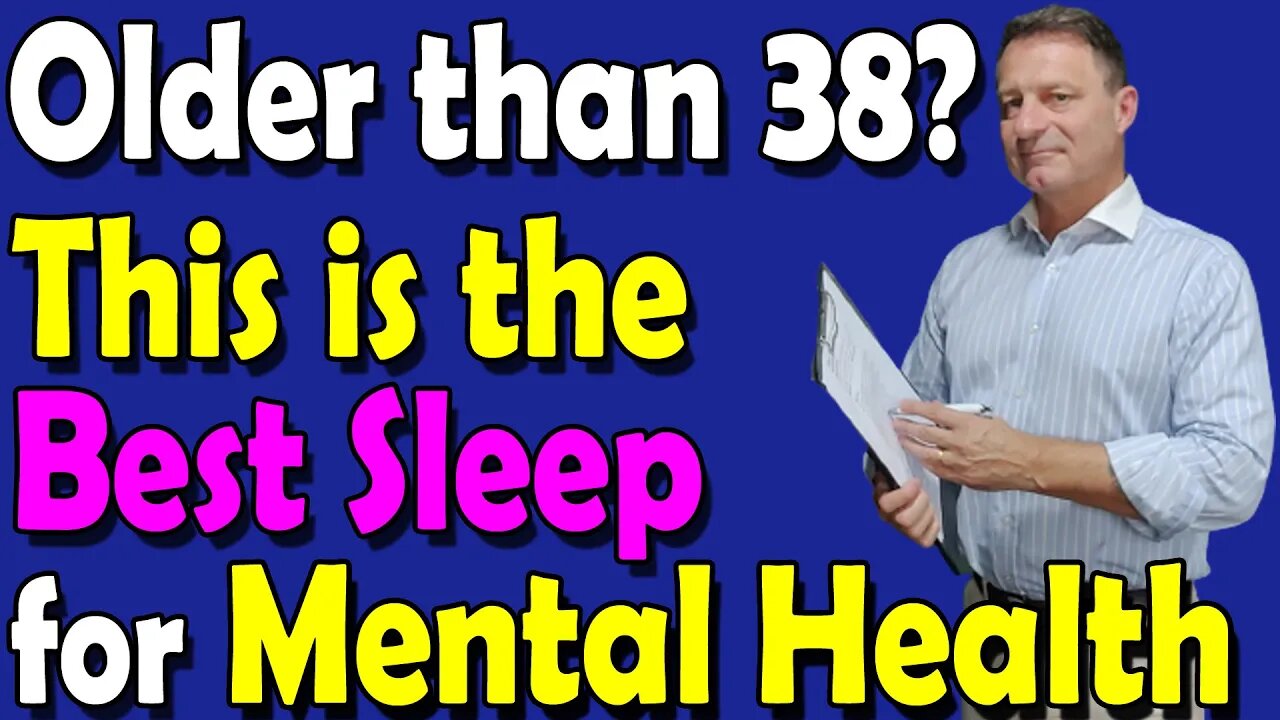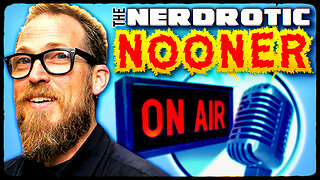Premium Only Content

2022 Research: How Many Hours Sleep for Optimal Mental Health & Brain Health?
a very new study looking into sleep has arrived at the amount of time, per night, that is optimal for Mental Health and Brain Health.
DoNotAge.org 10% Discount Code: MYNMN (https://bit.ly/2VBDgNt)
Renue by Science 10% Discount Code: MYNMN (https://bit.ly/350ahYM)
I hope you enjoy my content and find it interesting or informative, if so, please consider supporting the channel by signing up to the one you prefer:
*Buy me a Kofi: https://ko-fi.com/mynmnexperiment
*Patreon: https://bit.ly/3hhfjl5
*Subscribestar: https://bit.ly/3psYo23
My Current Anti-Aging Protocol:
• 1.5 grams of NMN (https://bit.ly/3c2Fxt8)
• 1.5 grams of Trans-resveratrol (Tue, Thu & Sat) (https://bit.ly/3yxeqy2)
• 1.5 grams of Berberine (https://bit.ly/3O0v5zq)
• 1.5 grams of TMG (https://bit.ly/3oe1Ted)
• 5,000 IU (International Units) of vitamin D3 (https://bit.ly/3P32hYH)
• 120 mcg (micrograms) of vitamin K2 (Mk 7) (https://bit.ly/3PhkBgn)
• 250mg Magnesium (L-Threonate) (https://bit.ly/3O4pZ5o)
• 200mg high molecular weight hyaluronic acid (https://bit.ly/3P0Z4c2)
• 2,400mg of Fisetin, on the 1st, 2nd & 3rd of each month (https://bit.ly/3P2rSB0)
• 2,400mg of Quercetin, on the 1st, 2nd & 3rd of each month (https://bit.ly/3IzulAy)
• 81mg of aspirin (https://bit.ly/3uFjtem)
Sleep Playlist: https://www.youtube.com/watch?v=8dxpE9gjFU4&list=PLmIveiOKG1RTIOV176BA6MUQDiass5oWZ&index=10
Sleep is a lot like eating food, it is one of those things we must do to live, but much like eating food, there are plenty of ways to do it wrong. This latest study looking at UK Biobank data from almost 500,000 adults. It aimed to discover the optimal amount of sleep needed by people for good mental health, wellbeing and cognitive performance, for people in their late 30’s to early 70’s. T he researchers write "We identified a nonlinear association between sleep, with approximately seven hours as the optimal sleep duration, and genetic and cognitive factors, brain structure, and mental health as key measures. Longitudinal analysis revealed that both insufficient and excessive sleep duration were significantly associated with a decline in cognition on follow up."
The team, led by neuroscientist Yuzhu Li from Fudan University in China and psychiatry researcher Barbara Sahakian from Cambridge University, looked at data from 498,277 participants aged 38-73 years as part of the UK Biobank study.
Around 48,500 of the participants also underwent neuro-imaging, and almost 157,000 participants completed an online mental health questionnaire follow-up. All these data points went together to provide a comprehensive view of how the amount of sleep people get correlates to other aspects of their mental and brain health. Similar to other studies of this nature, the researchers found a U-shape curve in the data.
Too little sleep lowered all measures of cognitive function and mental health that the team looked at. But so did too much sleep – up to 12-13 hours a day in some cases.
Because of the neuroimaging data, the researchers were also able to look into whether there were brain structural or genetic mechanisms behind the U-shape curve.
Modeling by the researchers suggests that genetics and brain structure do play a role, but much more research will be needed to follow up on these leads.
Professor Jianfeng Feng, said "While we can't say conclusively that too little or too much sleep causes cognitive problems, our analysis looking at individuals over a longer period of time appears to support this idea.
But the reasons why older people have poorer sleep appear to be complex, influenced by a combination of our genetic makeup and the structure of our brains."
Professor Sahakian said "Getting a good night's sleep is important at all stages of life, but particularly as we age. Finding ways to improve sleep for older people could be crucial to helping them maintain good mental health and wellbeing, and avoiding cognitive decline, particularly for patients with psychiatric disorders and dementias."
The study had some limitations, it only assessed how long the participants slept in total and not any other measure of sleep quality such as waking during the night, the length of deep and/or REM sleep. More importantly, participants reported their amount of sleep so it was not objectively measured, so they looked at the clock before going to sleep and walking up and didn’t use any type of sleep monitoring tracker.
DISCLAIMER: This video and description contain discount codes, which means that if you use the code, I will receive a small commission.
FAIR-USE COPYRIGHT DISCLAIMER
Copyright Disclaimer Under Section 107 of the Copyright Act 1976, allowance is made for "fair use" for purposes such as criticism, commenting, news reporting, teaching, scholarship, and research. Fair use is a use permitted by copyright statute that might otherwise be infringing. Non-profit, educational, or personal use tips the balance in favor of fair use. #sleep #sleepy #Insomnia
-
 8:03
8:03
My Longevity Experiment
11 months ago10 Forms of this Longevity Supplement, are you Taking the Wrong One?
1471 -
 LIVE
LIVE
Steven Crowder
3 hours ago🔴Can Donald Trump Bring Peace: Zelensky and EU Leaders Massive visit to Washington
23,989 watching -
 LIVE
LIVE
Nerdrotic
2 hours agoSuperman GUNNED DOWN | Marvel Phase SUX - Nerdrotic Birthday Nooner 508
290 watching -
 LIVE
LIVE
Side Scrollers Podcast
1 hour agoPETA AMBUSHES Nintendo + UK THREATENS 4Chan + Roblox Situation Is Crazy | Side Scrollers Live
236 watching -
 LIVE
LIVE
Viss
1 hour ago🔴LIVE - Learn To Dominate Battle Royale with Tactics and Strategy! - PUBG
98 watching -
 LIVE
LIVE
LFA TV
6 hours agoLFA TV ALL DAY STREAM - MONDAY 8/18/25
4,586 watching -
 LIVE
LIVE
The Mel K Show
1 hour agoMORNINGS WITH MEL K -Buckle Up! The Old Guard Will Not Go Quietly 8-18-25
875 watching -
 LIVE
LIVE
Flyover Conservatives
11 hours agoEpstein Files, FBI Failures & The Fight for Real Accountability - Breanna Morello | FOC Show
236 watching -
 LIVE
LIVE
GloryJean
2 hours agoAggressively Sniping My Way to WINS 🖱️ 6.7 K/D
28 watching -
 LIVE
LIVE
The Shannon Joy Show
2 hours ago🔥🔥Bombshell Study: Rancourt et al Reveals COVID Era Mass Death Occurred From Pandemic Response NOT A Spreading Virus🔥🔥
189 watching